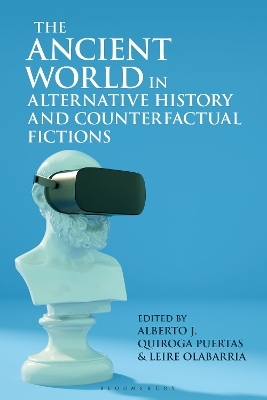
The Ancient World in Alternative History and Counterfactual Fictions
Bloomsbury Academic (Verlag)
978-1-350-28162-2 (ISBN)
Counterfactual fiction and uchronic narratives have been largely up until now the domain of literary critics. However, these modes of literature are here analysed by scholars of Ancient History, Egyptology and Classics, shedding important new light on how cultures of the ancient world have been (and still are) perceived, and to what extent our conceptions of the past are used to explore alternate presents and futures. Alternate history entices the imagination of the public by suggesting hypothetical scenarios that never occurred, underlining a latent tension between reality and imagination, and between determinism and contingency. This interest has resulted in a growing number of publications that gauge the impact of what-if narratives, and this one is the first to give scholars of the ancient world centre-stage.
Alberto J. Quiroga Puertas is Senior Lecturer in Ancient Greek at the University of Granada, Spain. Leire Olabarria is Lecturer in Egyptology at the University of Birmingham, UK.
List of Figures
List of Tables
List of Contributors
Foreword. On the Usefulness of What Didn’t Happen, Will Tattersdill (University of Glasgow, UK)
Acknowledgments
Introduction. The Ancient World in Alternative History and Counterfactual Fictions, Alberto J. Quiroga Puertas (University of Granada, Spain) and Leire Olabarria (University of Birmingham, UK)
Section 1. Fortuna Imperatrix Mundi. History between Chance and Determinism
1. ‘Delenda Est’: Counterfactual and Narratological Obligations in Poul Anderson’s Gerundive History, Genevieve Liveley (University of Bristol, UK)
2. Counter-Apostate, Counter-Christianity in John Christopher’s Fireball, Ryan C. Fowler (Franklin & Marshall College, USA)
3. ‘All that is Solid Melts into Air’: Destabilizing history in Robert Silverberg’s Roma Eterna, Sarah Annes Brown (Anglia Ruskin University, UK)
4. What if Aristotle Had Known (Better)? Lyon Sprague de Camp and the Counterfactual Exploration of Civilization and Progress, F. Javier Campos-Daroca (University of Almería, Spain)
Section 2. Narratives of Power in Uchronias: between ‘Big Men’ and Underrepresented Voices
5. The Triumph of Greek Civilization? Projecting Ancient Greece into an Alternate Future, Anastasia Bakogianni (Massey University, USA)
6. Emperor Julian’s American Dream, Alberto J. Quiroga Puertas (University of Granada, Spain) and Elia Otranto (University of Granada, Spain)
7. Alternat(iv)e Fiction in T. S. Chaudhry’s The Queen of Sparta: Unrepresented Voices and Counterfactuality, Lynn S. Fotheringham (University of Nottingham, UK)
Section 3. Art, Culture, and the Poetics of Counterfactuals
8. ‘A Picture that Can Only Ever Come in Parts’: Alternate Histories of the Arts in Catherynne M. Valente’s Radiance, Benjamin E. Stevens (Howard University, USA)
9. How Place Creates Time: Imagined Architecture as an Expression of Identity in Ramona Wheeler’s Three Princes, Leire Olabarria (University of Birmingham, UK)
10. Antiquity Interrupted: Partial Receptions as Counterfactuals, Jesse Weiner (Hamilton College, USA)
Notes
Bibliography
Index
| Erscheinungsdatum | 03.09.2024 |
|---|---|
| Reihe/Serie | Bloomsbury Studies in Classical Reception |
| Zusatzinfo | 1 bw image and 1 table |
| Verlagsort | London |
| Sprache | englisch |
| Maße | 156 x 234 mm |
| Themenwelt | Literatur ► Klassiker / Moderne Klassiker |
| Literatur ► Romane / Erzählungen | |
| Geschichte ► Allgemeine Geschichte ► Vor- und Frühgeschichte | |
| Geisteswissenschaften ► Sprach- / Literaturwissenschaft ► Anglistik / Amerikanistik | |
| Geisteswissenschaften ► Sprach- / Literaturwissenschaft ► Literaturwissenschaft | |
| ISBN-10 | 1-350-28162-X / 135028162X |
| ISBN-13 | 978-1-350-28162-2 / 9781350281622 |
| Zustand | Neuware |
| Informationen gemäß Produktsicherheitsverordnung (GPSR) | |
| Haben Sie eine Frage zum Produkt? |
aus dem Bereich


